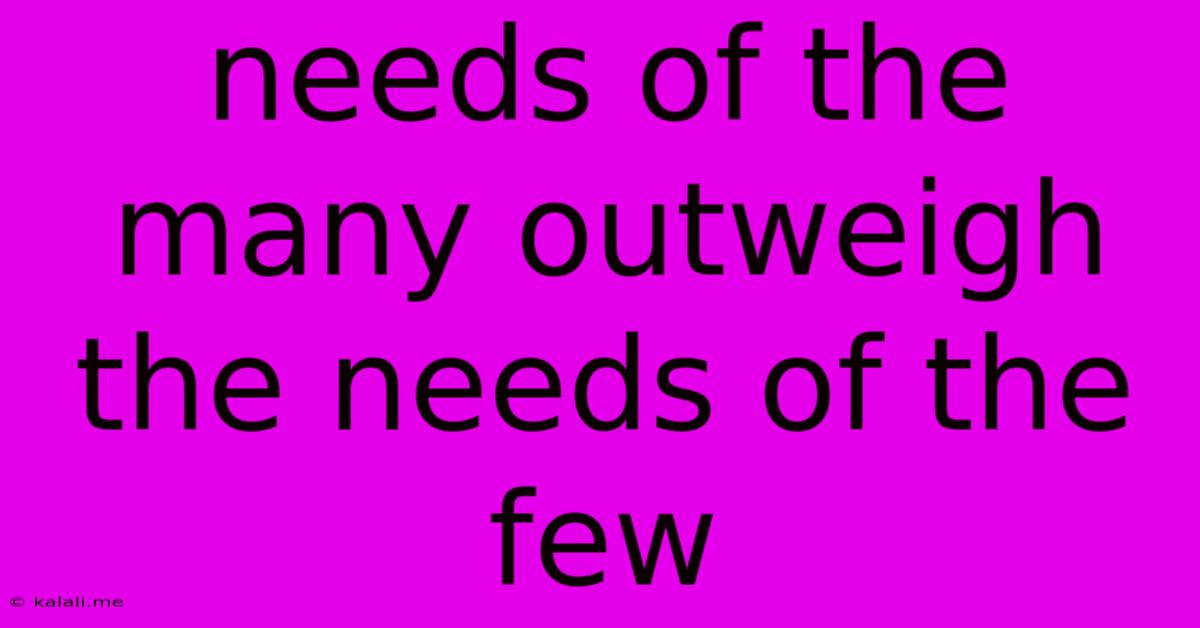Needs Of The Many Outweigh The Needs Of The Few
Kalali
May 29, 2025 · 3 min read

Table of Contents
The Needs of the Many: A Philosophical and Practical Exploration of Utilitarianism
The phrase "the needs of the many outweigh the needs of the few" is a cornerstone of utilitarian philosophy, a moral theory that champions actions that maximize overall happiness and well-being. This principle, often simplified, presents complex ethical dilemmas demanding careful consideration. This article will delve into the nuances of this principle, exploring its strengths, weaknesses, and practical applications in diverse scenarios.
What Does "The Needs of the Many" Actually Mean?
At its core, this principle advocates for a decision-making process that prioritizes the greatest good for the greatest number of people. It's not simply about counting heads; it involves a nuanced assessment of the impact of a decision on everyone affected. This involves:
- Quantifying Benefits and Harms: Determining the extent of benefits and harms to individuals and groups. This can be challenging, requiring careful consideration of both tangible and intangible consequences. For example, a new highway might benefit many commuters by reducing travel time, but harm a few whose homes are demolished. The net positive outcome, after weighing all factors, would determine the ethical course of action.
- Considering Long-Term Impacts: Short-term gains might seem appealing, but ethical decisions require foresight. We must consider the long-term consequences for all stakeholders involved. Environmental protection, for example, often involves sacrifices in the present for the benefit of future generations.
- Fairness and Justice: While maximizing overall well-being is paramount, the distribution of that well-being should also be considered. A solution that benefits the majority at the significant expense of a minority may not be considered just, even if it maximizes overall happiness.
Strengths of the Principle:
- Practical Application: The principle provides a clear framework for decision-making, particularly in situations involving resource allocation, public policy, and crisis management.
- Focus on Collective Well-being: It encourages consideration of the broader community, promoting a sense of social responsibility.
- Adaptability: The principle is adaptable to various contexts, offering a flexible ethical framework for diverse situations.
Weaknesses and Challenges:
- Difficulty in Measurement: Accurately measuring happiness and well-being is incredibly challenging. Subjective experiences make quantifying benefits and harms difficult, leading to potential biases.
- Potential for Tyranny of the Majority: The principle can be used to justify actions that harm minorities, even if those actions benefit the majority. This raises concerns about fairness and justice.
- Ignoring Individual Rights: In focusing on the collective good, individual rights and autonomy may be overlooked. For instance, sacrificing individual privacy for enhanced national security is a contentious area within this framework.
Real-World Examples:
The principle manifests in various scenarios:
- Public Health Emergencies: During a pandemic, prioritizing the vaccination of the most vulnerable segments of the population, even if it means delaying vaccination for others, can be justified based on this principle.
- Resource Allocation: Decisions regarding the distribution of scarce resources like organs for transplant often involve considerations of maximizing benefit for the largest number of recipients.
- Environmental Policy: Implementing policies to mitigate climate change, even if they impose costs on individuals or businesses, can be justified by the long-term benefits to the global community.
Conclusion:
The principle "the needs of the many outweigh the needs of the few" provides a valuable framework for ethical decision-making, but its application demands careful consideration of its inherent limitations. While maximizing overall well-being is a noble goal, it's crucial to incorporate principles of fairness, justice, and respect for individual rights to ensure ethical and equitable outcomes. The challenge lies not only in identifying the greatest good but also in ensuring that the pursuit of this good does not come at the unacceptable cost of the few. A truly ethical approach requires a balanced perspective, acknowledging both the collective and individual needs within a complex societal framework.
Latest Posts
Latest Posts
-
Black Eyed Peas Food In Spanish
May 31, 2025
-
How Do I Update Games On Xbox 360
May 31, 2025
-
Term For Hitting An Electronic Device To Get Working
May 31, 2025
-
Add Legs To A Coffee Table To Make It Higher
May 31, 2025
-
As They Removed Their Nails From The Ground
May 31, 2025
Related Post
Thank you for visiting our website which covers about Needs Of The Many Outweigh The Needs Of The Few . We hope the information provided has been useful to you. Feel free to contact us if you have any questions or need further assistance. See you next time and don't miss to bookmark.